George III
Correspondences on the Slave Trade (1778)
Below are three correspondences which document King George III’s comments on the slave trade.
Introduction
The following are three correspondences which document George III’s comments on the slave trade.
- April 1778 letter: from Lord Chief Justice William Murray to George III: asking for advance to peerage for him or his family.
- May 1778 letter: George III to Lord North; discussing the continued appointment of Lord North to the treasury and refusing to put him in charge of the Cinque Ports
- October 1778 letter: exchange between George II and Lord North; discussing an attempt on the island of Goree.
Particularly, in the October correspondence, Lord North (Prime Minister of Great Britain) and King George III discuss the possibility of capturing the island of Gorée off the West African coast (now Senegal). The theater of the American Revolutionary War expanded with the entrance of the French into the conflict in 1778, and North and George saw an opportunity to regain territory captured from the French during the Seven Years War (1754-1763) and ceded back to them in the peace treaty.
Capturing Gorée again was an enticing prospect, as it opened up another trading location off the West African coast—trade that included enslaved persons. While there is some dispute between historians over how important Gorée was in the slave trade, it nevertheless was a place where enslaved persons were traded and, most crucially, was viewed as a location worth controlling by the heads of the British and French empires.
In May 1779, the British Navy captured Gorée and held the island until the Treaty of Paris (1783) ceded the island back to the French. As you read the correspondence between the king and his chief minister, consider how their discussion of this island fits within the criticisms outlined in Jefferson’s Declaration of Independence draft.
Lauren Michalak
Further Reading
- Anderson, Fred. Crucible of War: The Seven Years’ War and the Fate of Empire in British North America, 1754-1766. (New York: Alfred A. Knopf, 2000).
- Araujo, Ana Lucia. Shadows of the Slave Past: Memory, Heritage, and Slavery. (London: Routlege, 2016).
- Searing, James F. West African Slavery and Atlantic Commerce: The Senegal River Valley, 1700-1860. (Cambridge: Cambridge University Press, 1993).
Sources
© His Majesty King Charles III 2025
Transcription by Michael Becker and Dylan Bails
George III to Lord North, May 19, 1778. GEO/MAIN/2974, Royal Archives.
© His Majesty King Charles III 2025
Transcription by Michael Becker and Dylan Bails
Lord North to George III, October 4, 1778. GEO/MAIN/3087-3088, Royal Archives.
© His Majesty King Charles III 2025
Transcription by Michael Becker and Dylan Bails
George III to Lord North, October 5, 1778. GEO/MAIN/3089, Royal Archives.
© His Majesty King Charles III 2025
Transcription by Michael Becker and Dylan Bails
Cite this page
Content Warning
Some of the works in this project contain racist and offensive language and descriptions that may be difficult or disturbing to read. Please take care when reading these materials, and see our Ethics Statement and About page.
Lord Chief Justice de Grey to George III, April 15, 1778
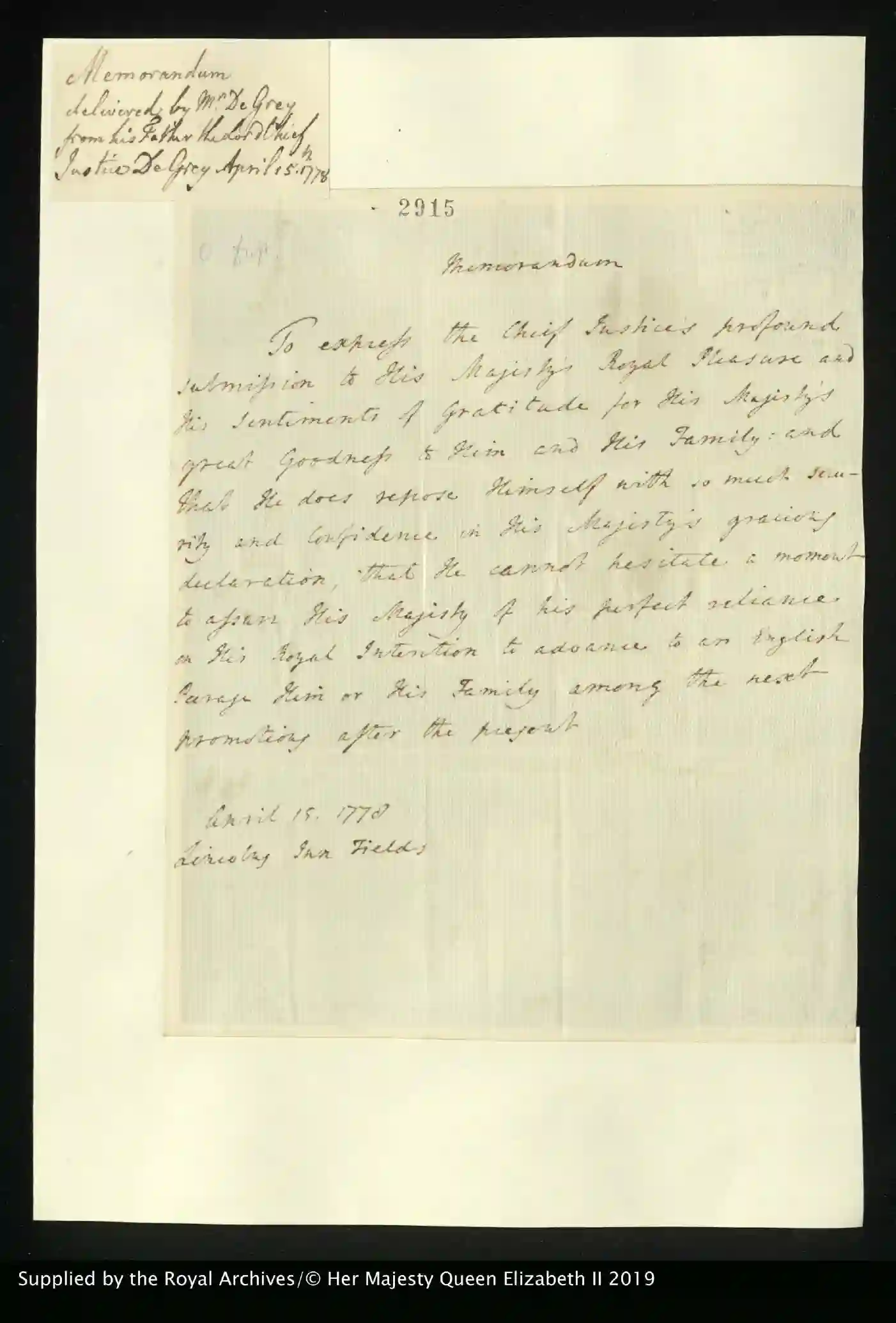
© His Majesty King Charles III 2025
delivered by Mr. De Grey
from his Father the Lord Chief
Justice De Grey April 15th 1778
Memorandum
To express the Cheif Justice’s profound
submission to His Majesty’s Royal Pleasure and
His sentiments of Gratitude for His Majesty’s
great Goodness to Him and His Family: and
that He does repose himself with so much secu-
rity and Confidence in His Majesty’s gracious
declaration, that He cannot hesitate a moment
to assure His Majesty of his perfect reliance
on His Royal Intention to advance to an English
Peerage Him or His Family among the next
promotions after the present
April 15. 1778
Lincolns Inn Fields
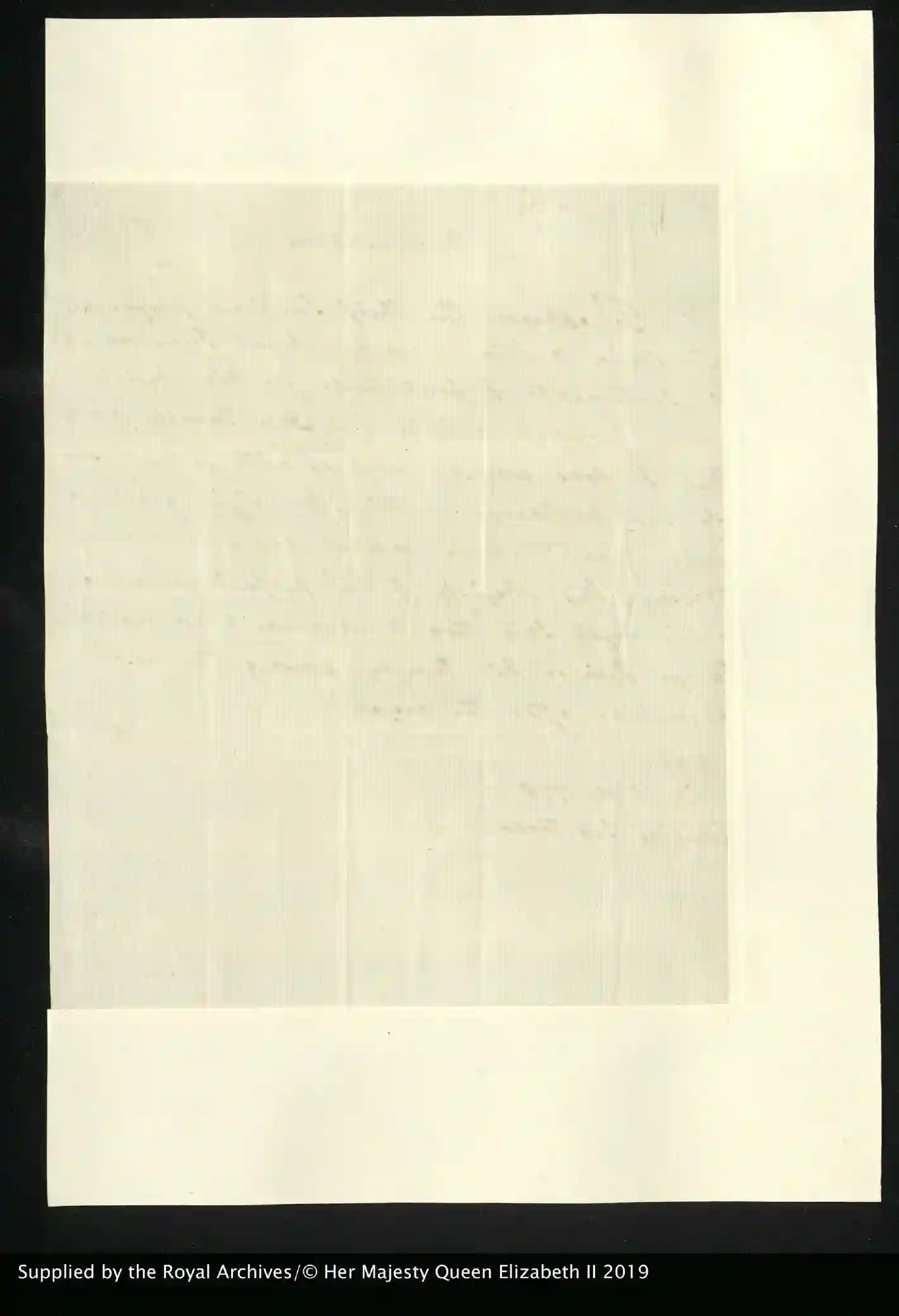
© His Majesty King Charles III 2025
George III to Lord North, May 19, 1778
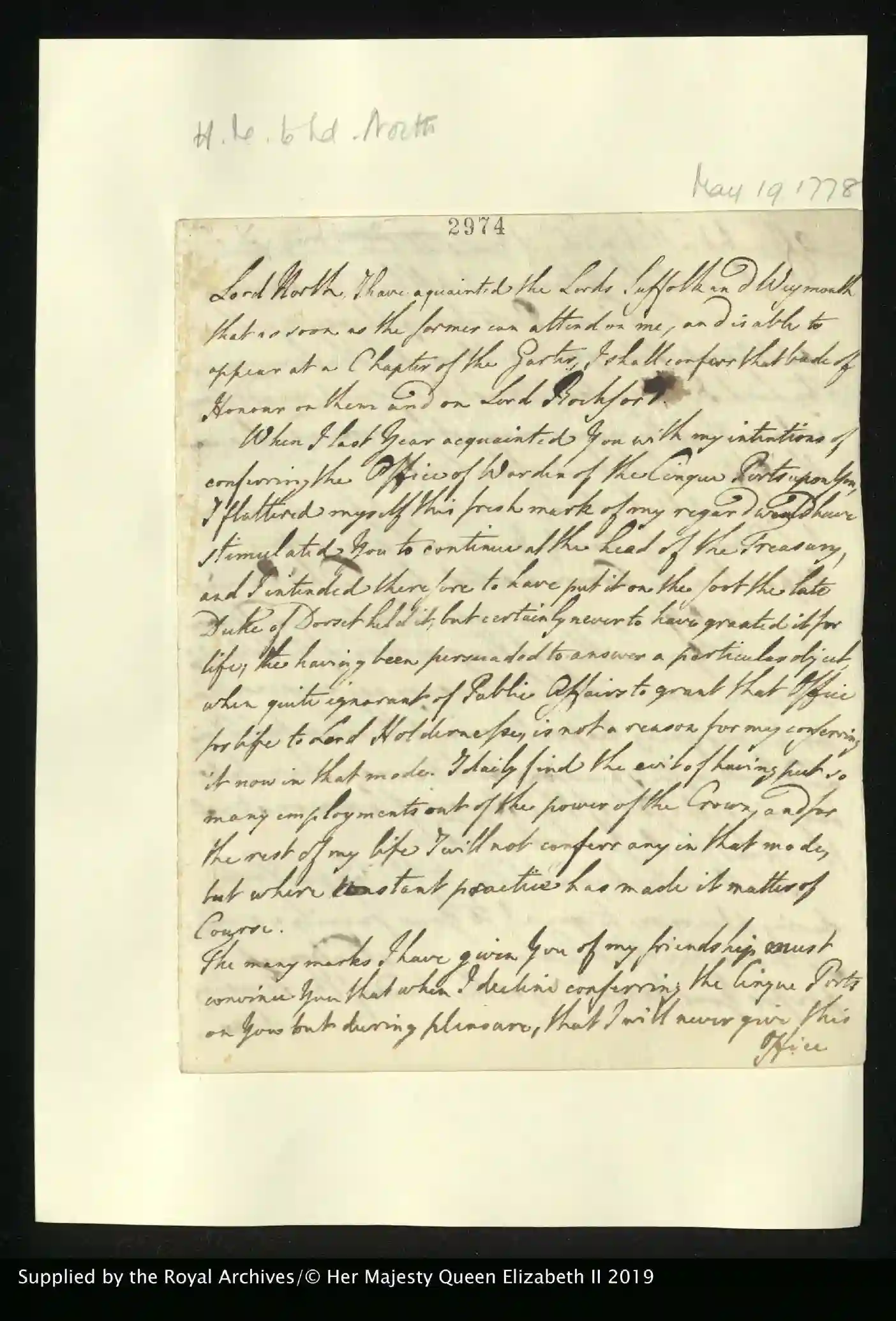
© His Majesty King Charles III 2025
that as soon as the former can attend on me, and is able to
appear at a Chapter of the Garter, I shall conferr that bade*badge of
Honour on them and on Lord Rochford.
When I last Year acquainted you with my intentions of
conferring the Office of Warden of the Cinque Ports upon you,
I flattered myself this fresh mark of my regard would have
stimulated you to continue at the head of the Treasury,
and I intended therefore to have put it on the foot the late
Duke of Dorset held it, but certainly never to have granted it for
life; the having been persuaded to answer a particular object,
when quite ignorant of Public Affairs to grant that Office
for life to Lord Holdernesse, is not a reason for my conferring
it now in that mode. I daily find the evil of having put so
many employments out of the power of the Crown, and for
the rest of my life I will not conferr any in that mode,
but where constant practice has made it matter of
Course.
The many marks I have given you of my friendship must
convince you that when I decline conferring the Cinque Ports
on you but during pleasure, that I will never give this
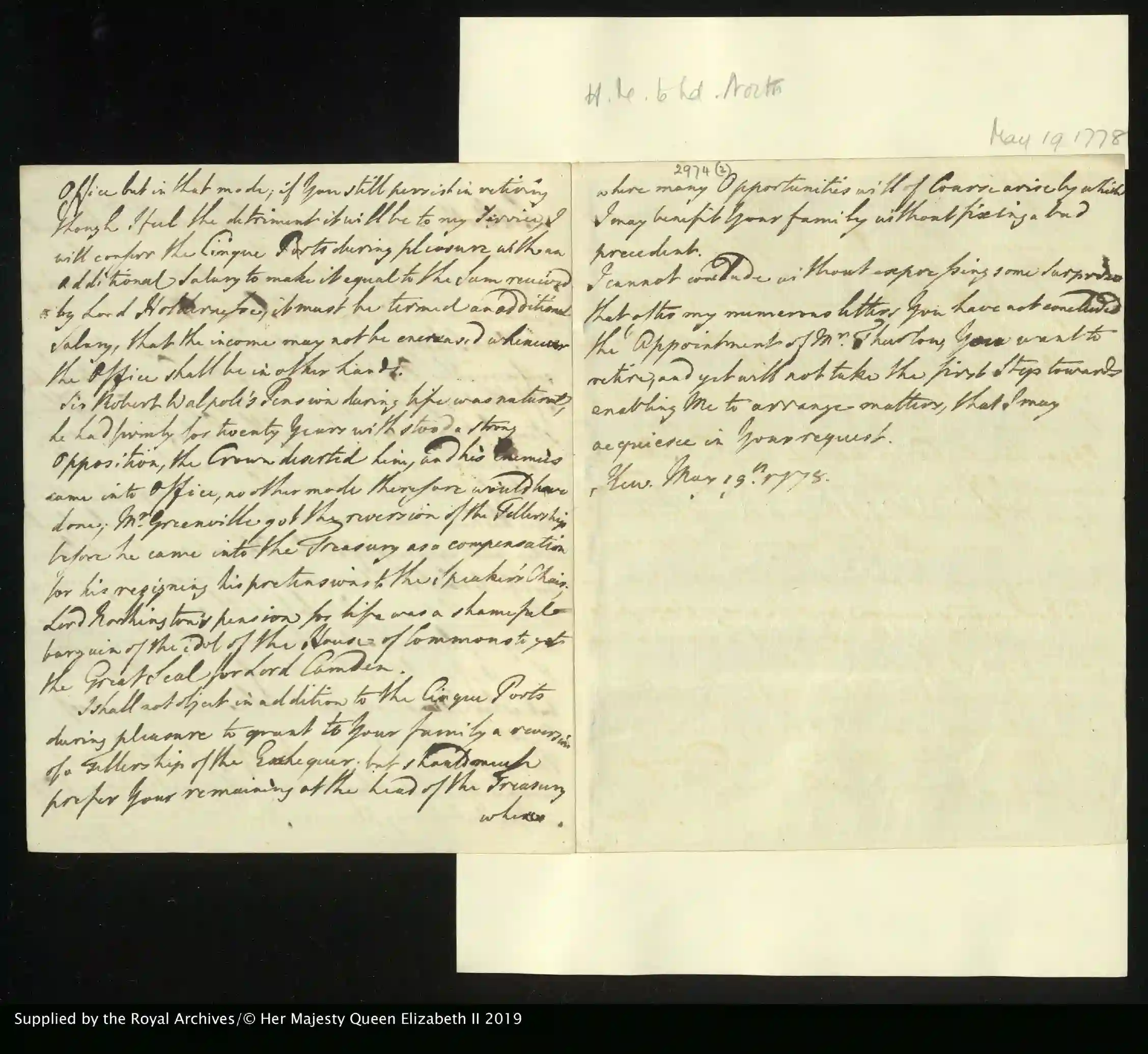
© His Majesty King Charles III 2025
Office but in that mode; if you still persist in retiring
though I feel the detriment it will be to my Service, I
will conferr the Cinque Ports during pleasure with an
additional Salary to make it equal to the Sum received
by Lord Holdernesse, it must be termed an additional
Salary, that the income may not be encreased whenever
the Office shall be in other hands.
Sir Robert Walpole’s Pension during life was natural,
he had firmly for twenty Years withstood a strong
Opposition, the Crown deserted him, and his Enemies
came into Office, no other mode therefore would have
done; Mr. Grenville got the reversion of the Tellership
before he came into the Treasury as a compensation
for his resigning his pretensions to the Speaker’s Chair;
Lord Northington’s pension for life was a shameful
bargain of the idol of the House of Commons to get
the Great Seal for Lord Camden.
I shall not object in addition to the Cinque Ports
during pleasure to grant to your family a reversion
of a Tellership of the Exchequer; but should much
prefer your remaining at the head of the Treasury
[right page]
where many Opportunities will of Course arise by which
I may benefit your family without fixing a bad
precedent.
I cannot conclude without expressing some surprize
that after my numerous letters you have not concluded
the Appointment of Mr. Thurlow, you want to
retire, and yet will not take the first Step towards
enabling Me to arrange matters, that I may
acquiesce in your request.
Kew. May 19th 1778.
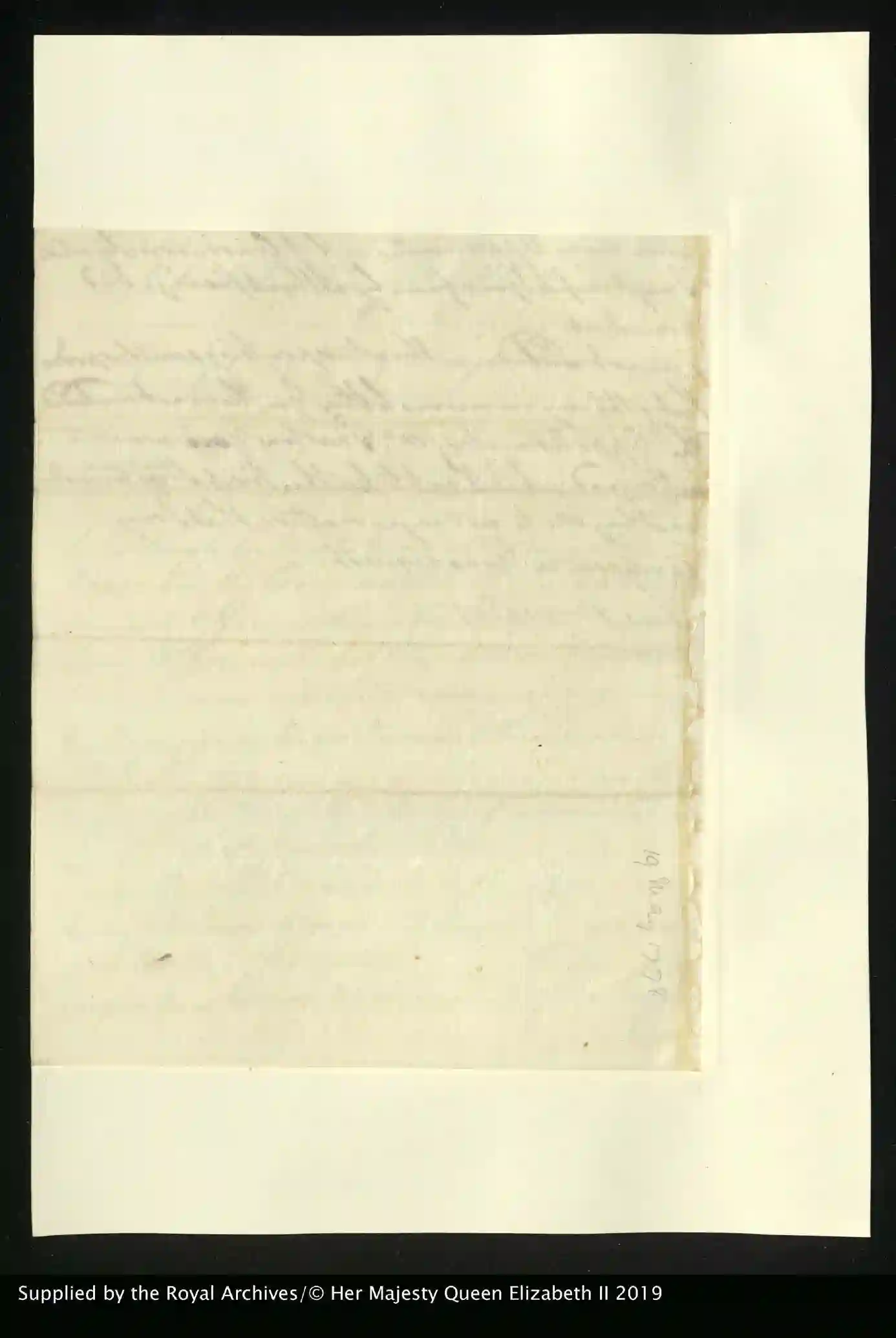
© His Majesty King Charles III 2025
Lord North to George III, October 4, 1778
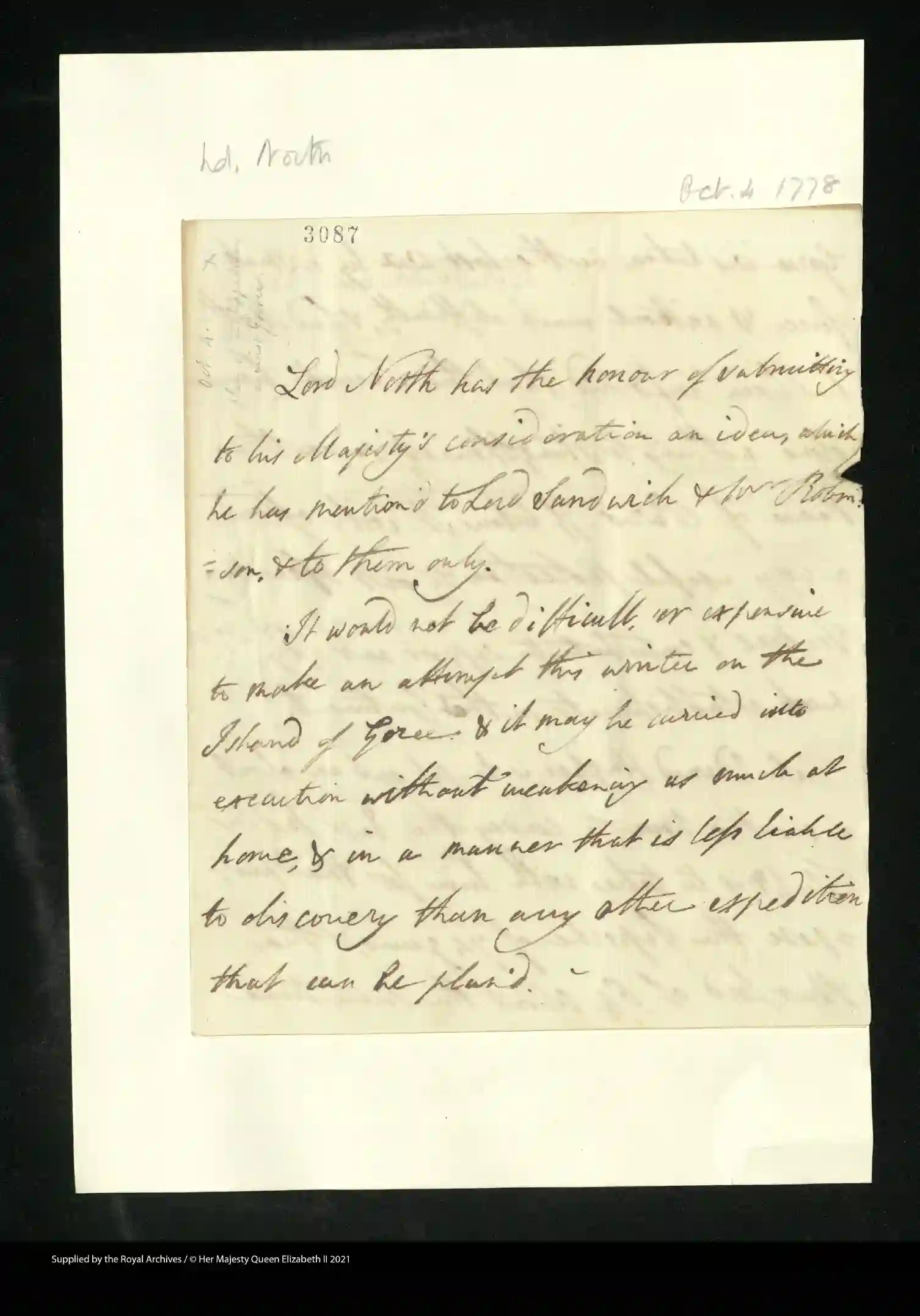
© His Majesty King Charles III 2025
to his Majesty’s consideration an idea, which
he has mention’d to Lord Sandwich* John Montagu, fourth earl of Sandwich, and First Lord of the Admiralty. & Mr. Robin-
son*John Robinson, Member of Parliament and Secretary of the Treasury., & to them only.
It would not be difficult, nor expensive
to make an attempt this winter on the
Island of Goree & it may be carried into
execution without weakening us much at
home, & in a manner that is less liable
to discovery than any other expedition
that can plan’d.
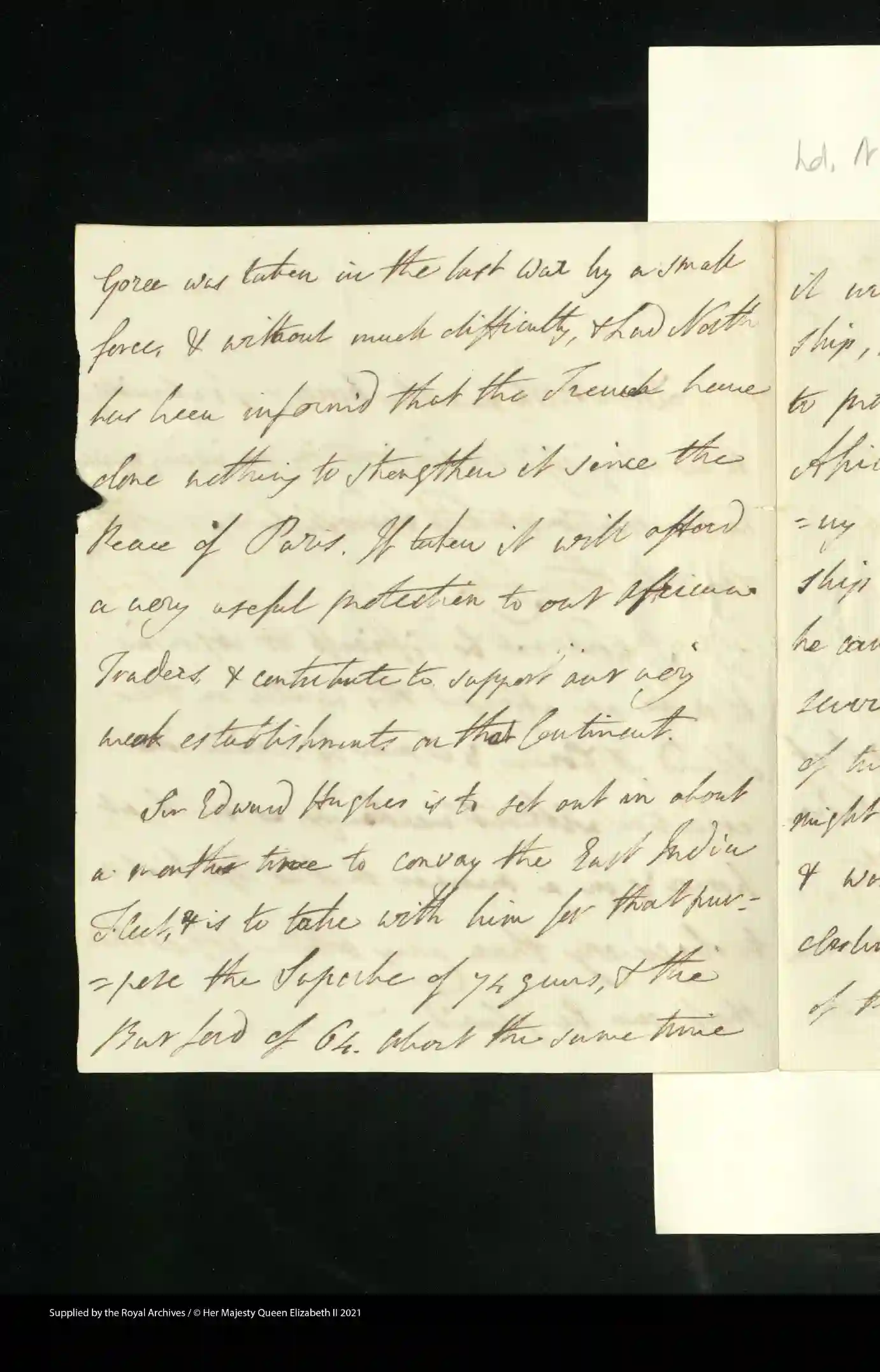
© His Majesty King Charles III 2025
force, & without much difficulty, & Lord North
has been inform’d that the French have
done nothing to strengthen it since the
Peace of Paris.*Peace of Paris (1763) resolved the conflict of the Seven Years War and returned Gorée to French control.
If taken it will afford
a very useful protection to our African
Traders, & contribute to support our very
weak establishments on that Continent.
Sir Edward Hughes is to set out in about
a months time to convoy the East India
Fleet, & is to take with him for that pur-
pose the Superbe of 74 guns, & the
Burford of 64. About the same time
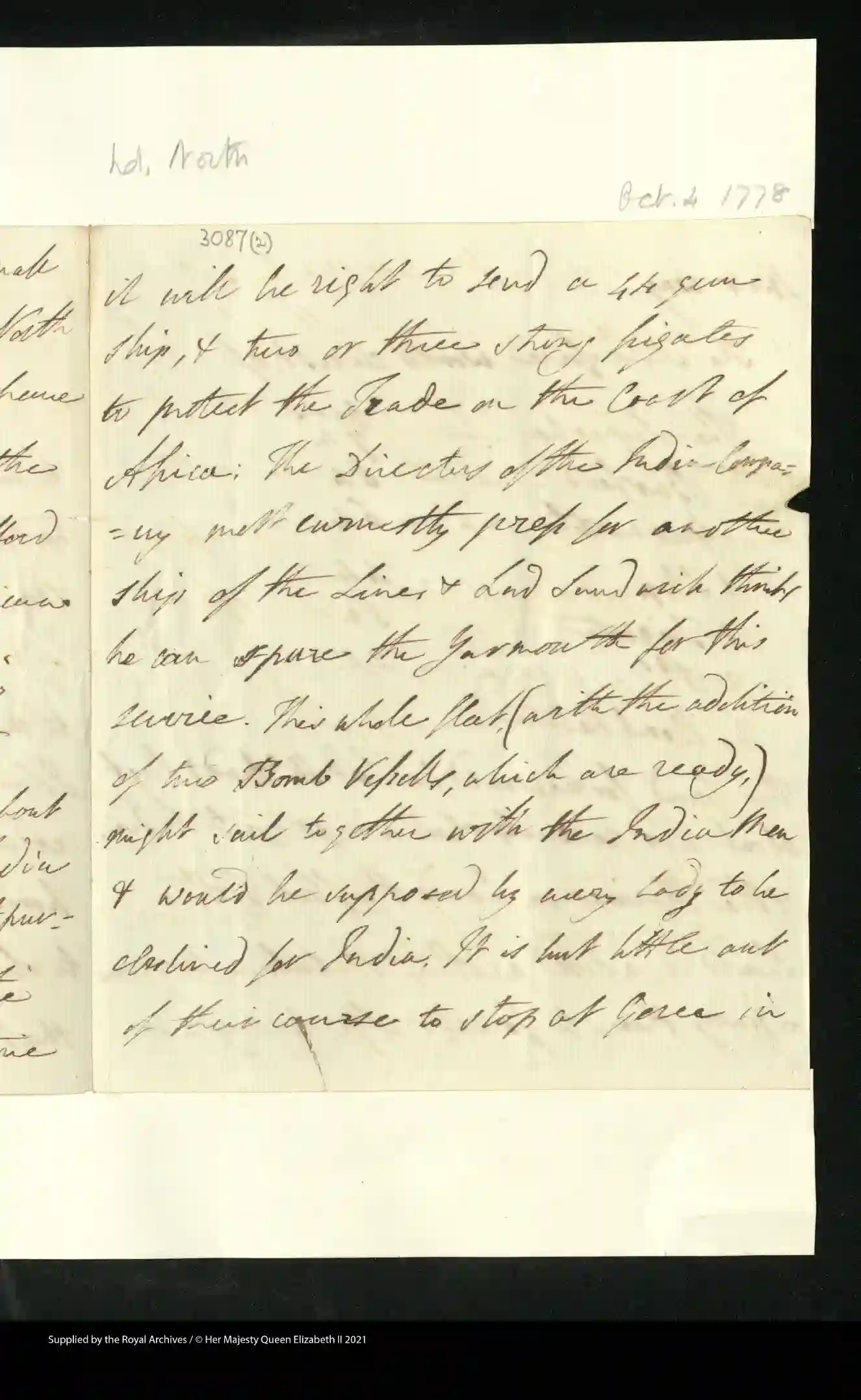
© His Majesty King Charles III 2025
ship, & two or three strong frigates
to protect the Trade on the Coast of
Africa; The Directors of the India Compa-
ny most earnestly press for another
ship of the Line, & Lord Sandwich thinks
he can spare the Yarmouth for this
service. This whole fleet (with the addition
of two Bomb Vessells, which are ready,)
might sail together with the India Men
& would be supposed by every body to be
destined for India. It is but little out
of their course to stop at Goree in
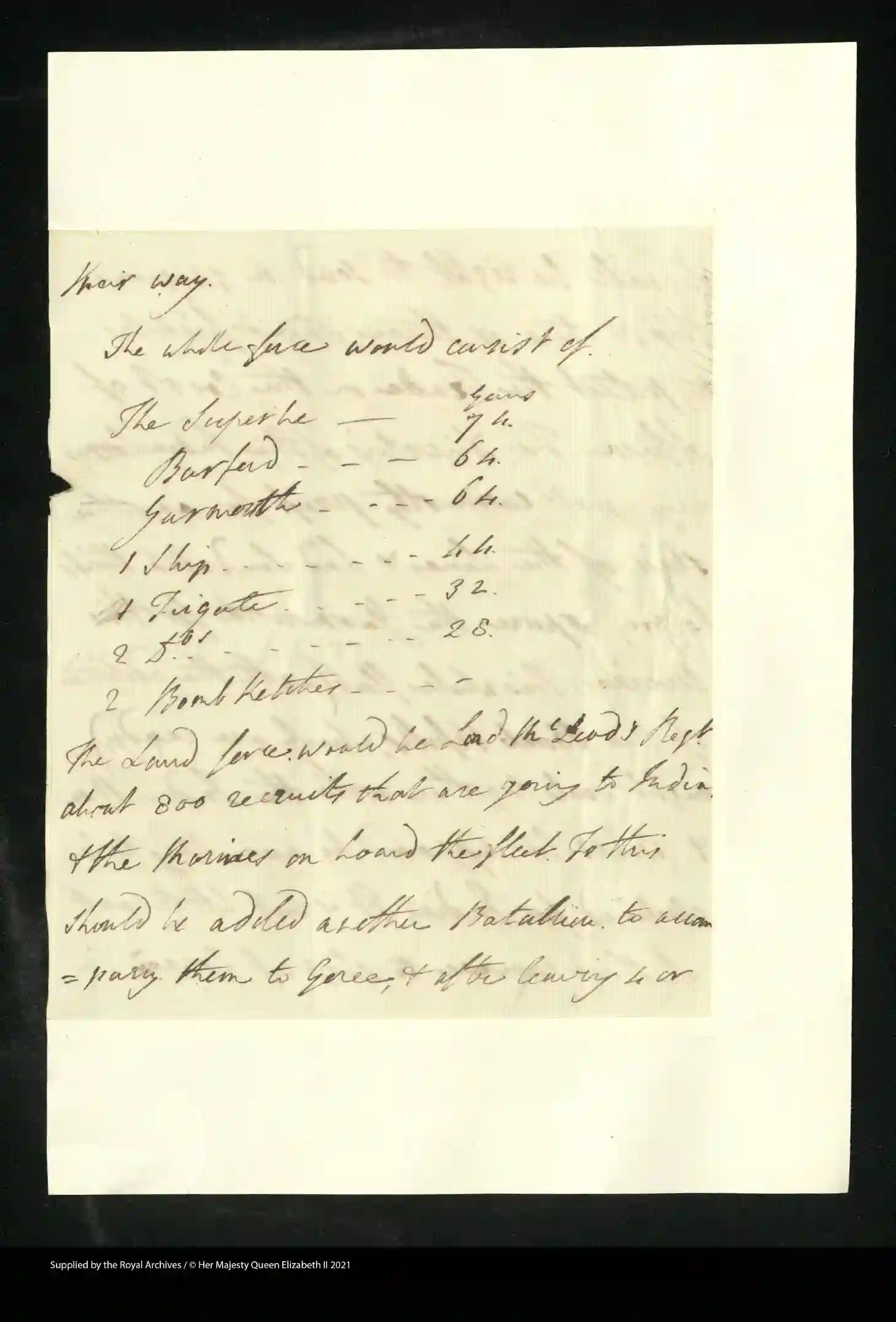
© His Majesty King Charles III 2025
The whole force would consist of:
— Guns
The Superbe 74.
Burford 64.
Yarmouth 64.
1 Ship 44.
1 Frigate 32.
2 dos. 25.
2 Bomb Ketches –
The Land force would be Lord McLeod’s Regiment
about 800 recruits that are going to India,
& the Marines on board the fleet. To this
should be added another Batallion to accom-
pany them to Goree, & after leaving 4 or
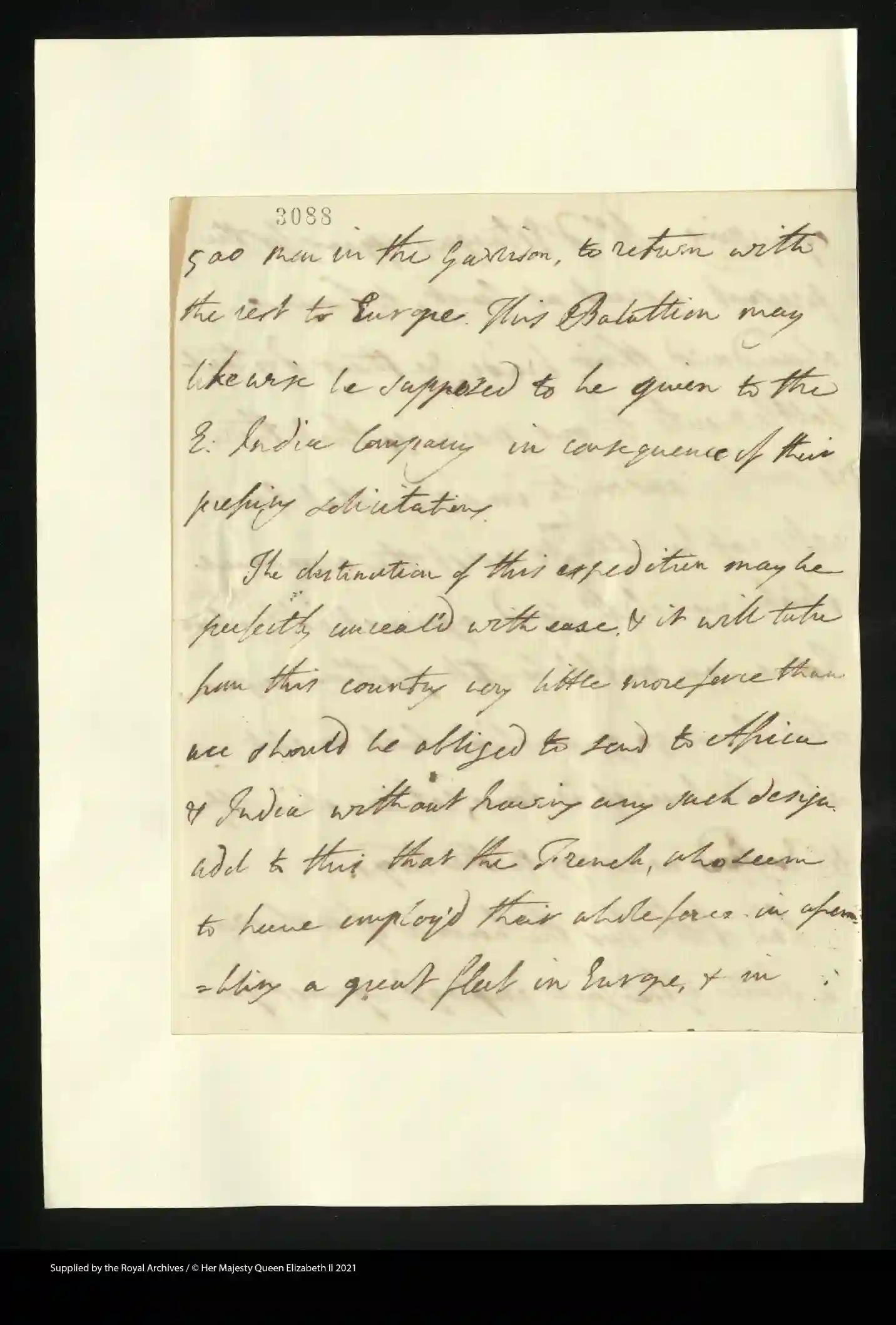
© His Majesty King Charles III 2025
the rest to Europe. This Batallion may
likewise be supposed to be given to the
E. India Company in consequence of their
pressing solicitations.
The destination of this expedition may be
perfectly conceal’d with ease, & it will take
from this country very little more force than
we should be obliged to send to Africa
& India without having any such design.
Add to this that the French, who seem
to have employ’d their whole force in assem-
bling a great fleet in Europe, & in

© His Majesty King Charles III 2025
present moment at least, to have
abandon’d their trade, & their distant
settlements to our mercy, so that there
is much reason to imagine that Goree
will not be able long to resist that armament
which we shall send against it & which
I dare say, might be still further augmen-
ted by a 50 gun ship, which might,
when the business is done, return directly
to England as convoy to the troops.
Lord North has the honour of inclosing
a state of the force employ’d against Goree
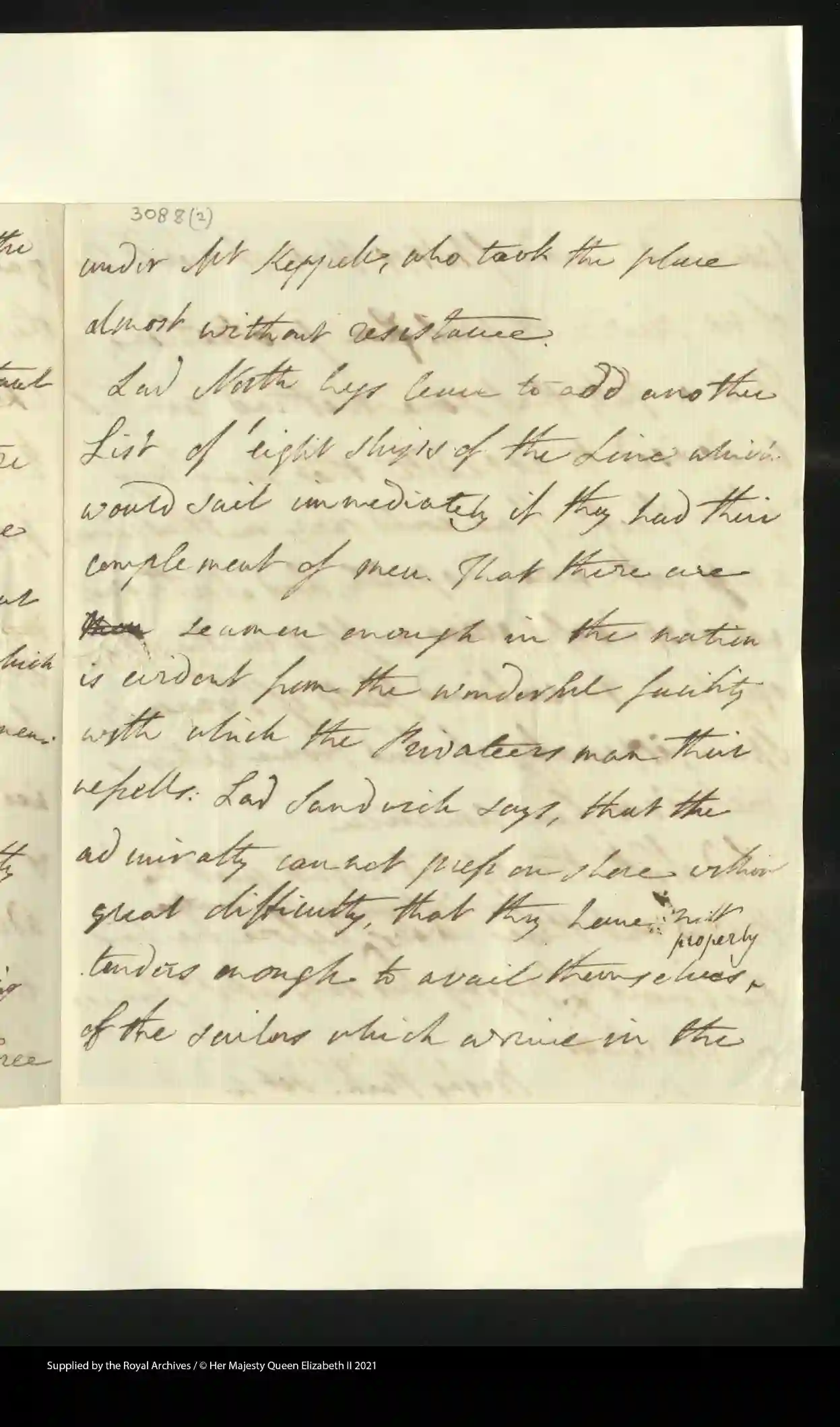
© His Majesty King Charles III 2025
almost without resistance.
Lord North begs leave to add another
List of eight ships of the Line which
would sail immediately if they had their
complement of men. That there are
Men seamen enough in the nation
is evident from the wonderful facility
with which the Privateers man their
vessells. Lord Sandwich says, that the
admiralty cannot press on shore without
great difficulty, that they have not
tenders enough to avail themselves properly
of the sailors which arrive in the
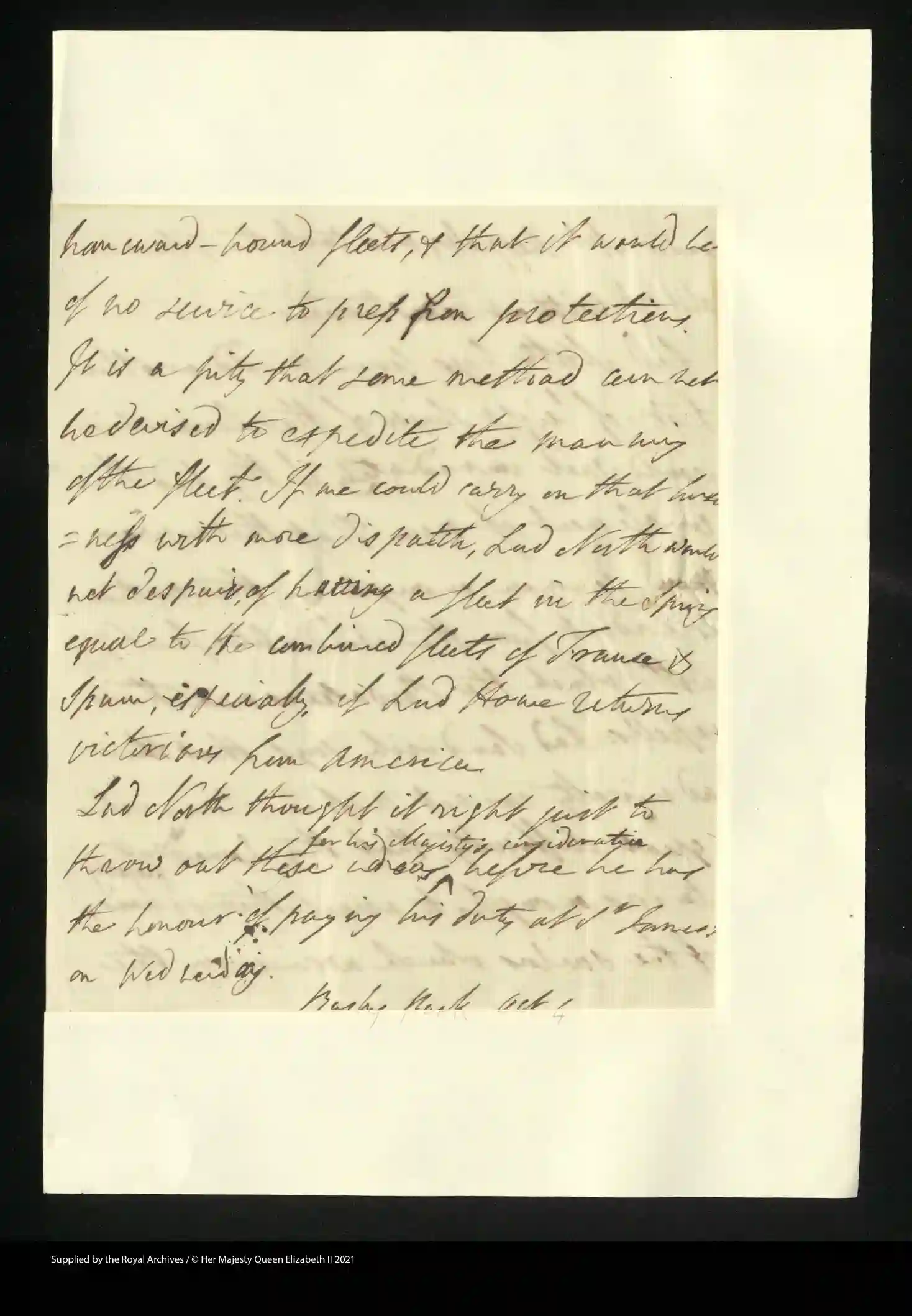
© His Majesty King Charles III 2025
of no service to press from protections.
It is a pity that some method can not
be devised to expedite the manning
of the fleet. If we could carry on that busi-
ness with more dispatch, Lord North would
not despair of having a fleet in the Spring
equal to the combined fleets of France &
Spain, especially, if Lord Howe returns
victorious from America.
Lord North thought it right just to
throw out these ideas for his Majesty’s consideration before he has
the honour of paying his duty at St. James’s
on Wednesday.
Bushy Park, Oct. 4
George III to Lord North, October 5, 1778
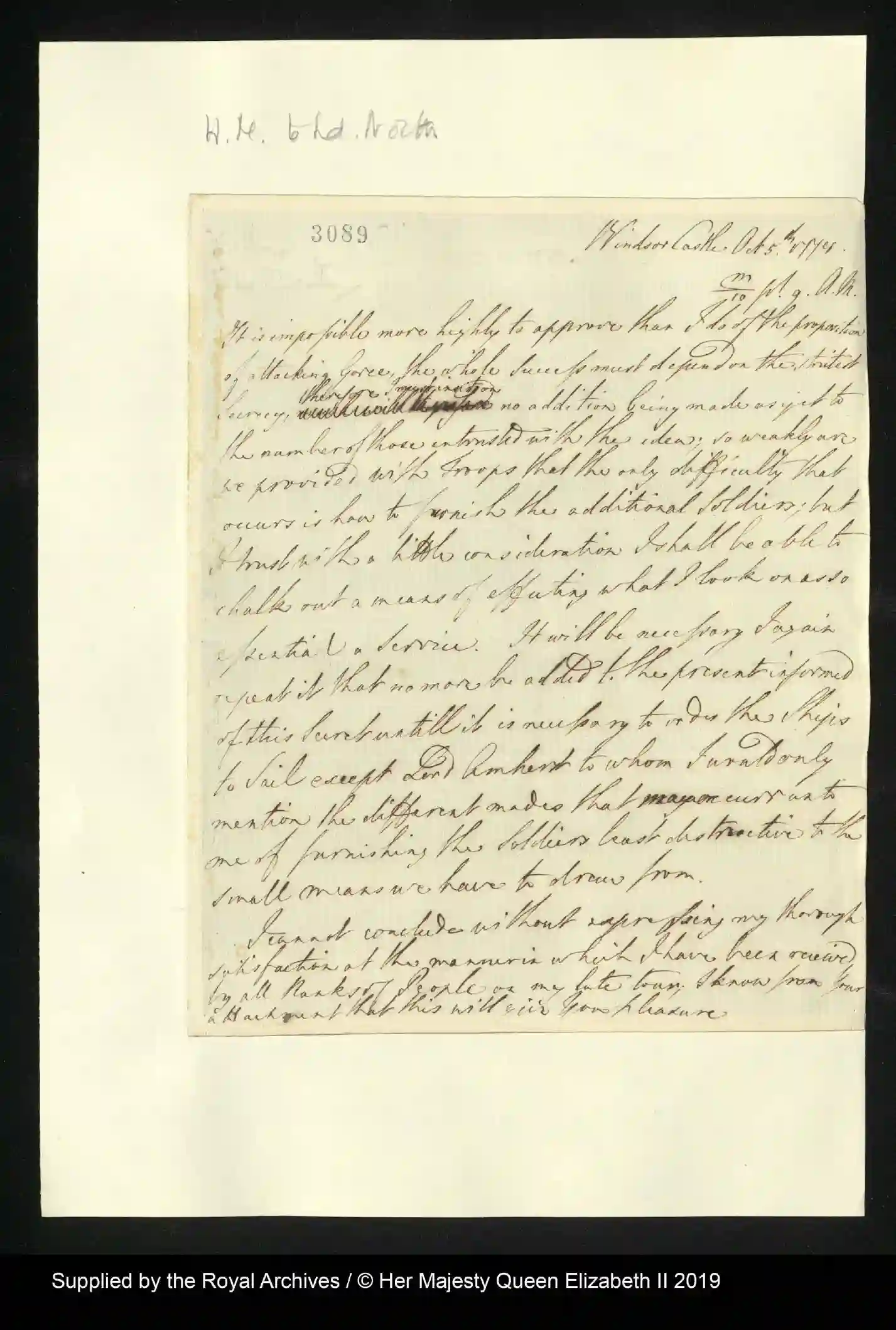
© His Majesty King Charles III 2025
m/10 pt. 9 A.M. *10 minutes past 9 a.m. George III was extremely particular in his correspondence, and included not only the date of the letter, but the time the letter was written.
It is impossible more highly to approve than I do of the proposition
of attacking Goree, the whole success must depend on the strictest
Secrecy, [? will therefore] therefore, I must insist on no addition being made as yet to
the number of those entrusted with the idea; so weakly are
we provided with Troops that the only difficulty that
occurs is how to furnish the additional Soldiers; but
I trust with a little consideration I shall be able to
chalk out a means of effecting what I look on as so
essential a Service. It will be necessary I again
repeat it that no more be added to the present informed
of this Secret untill it is necessary to order the Ships
to Sail except Lord Amherst to whom I would only
mention the different modes that may occurr unto
me of furnishing the Soldiers least destructive to the
small means we have to draw from.
I cannot conclude without expressing my thorough
satisfaction at the manner in which I have been received
by all Ranks of People on my late tour; I know from Your
attachment that this will give You pleasure.
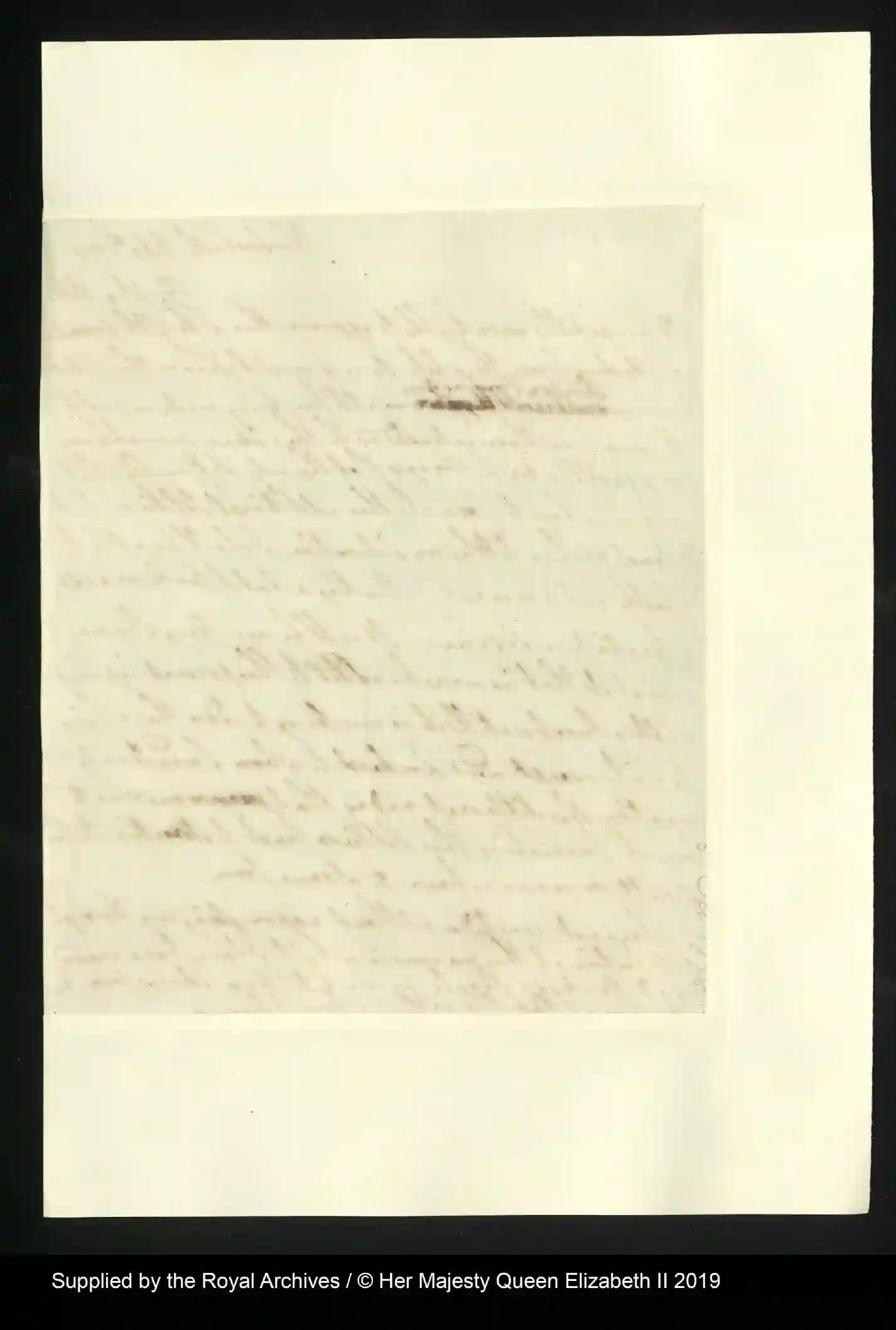
© His Majesty King Charles III 2025
References
Collections
Tags
- Fred Anderson, Crucible of War: The Seven Years’ War and the Fate of Empire in British North America, 1754-1766
- Ana Lucia Araujo, Shadows of the Slave Past: Memory, Heritage, and Slavery
- James Searing, West African Slavery and Atlantic Commerce: The Senegal River Valley, 1700-1860
- Sir John Fortescue, ed., The Correspondence of King George the Third From 1760 to December 1783, vol. 4 (London: Macmillan and Co., 1928), 111, 145-146, 201-203.
- Original manuscript held by the Georgian Papers Programme, Royal Archives, Windsor Castle (Lord North letter: GEO/MAIN/3087-3088 (Not yet digitized) & George III letter)
Footnotes
- *10 minutes past 9 a.m. George III was extremely particular in his correspondence, and included not only the date of the letter, but the time the letter was written.